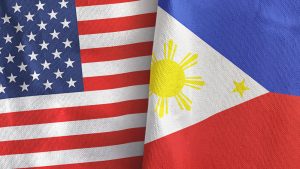Philippine President Rodrigo Duterte has once again suspended his decision to cancel an important defense accord with the United States, increasing the likelihood that it will survive the remaining 11 months of his presidential term.
In a video announcement yesterday, Foreign Secretary Teodoro Locsin Jr. said that Duterte had decided to extend the suspension of the Visiting Forces Agreement (VFA) for a further six months, in order to study the matter and allow both nations to “further address his concerns regarding particular aspects of the agreement.”
Locsin made the announcement after emerging from a meeting with Duterte and Jose Manuel Romualdez, the Philippine ambassador to the United States, who has led negotiations between Manila and Washington about possible changes to the terms of the VFA. Earlier this month, Romualdez told reporters that the talks had “improved” the deal between the two countries and said he was “very confident that it will pull through.”
This is the third six-month stay granted to the abrogation of the VFA, a bilateral accord that lays out the procedures governing U.S. military personnel based in the Philippines, including the handling of criminal cases involving them.
The accord has long been criticized by a small constituency in the Philippines, mostly on the political left, which views the accord as a symbol of the country’s continuing dependence on the United States, and claim the VFA has allowed U.S. personnel to commit crimes in the Philippines with impunity.
Duterte’s initial decision to scrap the VFA in February 2020 stemmed from a combination of his own ingrained anti-American impulses and anger at the U.S. government’s decision to impose a visa ban on his ally, the former Philippine National Police chief Ronald dela Rosa, for his central role in the early stages of Duterte’s notorious “war on drugs.”
Duterte subsequently suspended the cancellation of the agreement for six months in June, due to the outbreak of the COVID-19 pandemic and increasing tensions in the disputed South China Sea, and then for a further six months in November. With this latest suspension, the VFA will remain in force until February 2022, just three months shy of the Philippine presidential election and the end of Duterte’s single term in office.
It is unclear exactly what changes Duterte wishes to see to the VFA, although he seems intent on using the threat of its cancellation to wring concessions from Washington. In December, for instance, he announced that the U.S. government would have to deliver 20 million doses of COVID-19 vaccines in order to save the accord, adding, “no vaccine, no stay here.”
Since taking office in 2016, Duterte has spurned the U.S., railing against American criticisms of his drug war and threatening to kick out U.S. military personnel and abrogate the two nations’ longstanding treaty alliance, which marks its 70th anniversary in August. At the same time, he has steered the Philippines closer to China, despite Beijing’s increasingly assertive actions in the South China Sea, where the two countries have maritime and territorial disputes.
This latest decision increases the likelihood that the VFA, and the Philippine-U.S. alliance more generally, will survive Duterte’s presidential term battered but intact. As such, it is likely to be cheered in Washington, where many policymakers view the Philippines as an important partner in the push to contain Chinese power and ambition in the western reaches of the Pacific.
In a statement yesterday, the U.S. Embassy in Manila welcomed Duterte’s decision. “Our alliance continues to contribute not only to the security of our two nations, but also strengthens the rules-based order that benefits all nations in the Indo-Pacific,” the statement read.

































